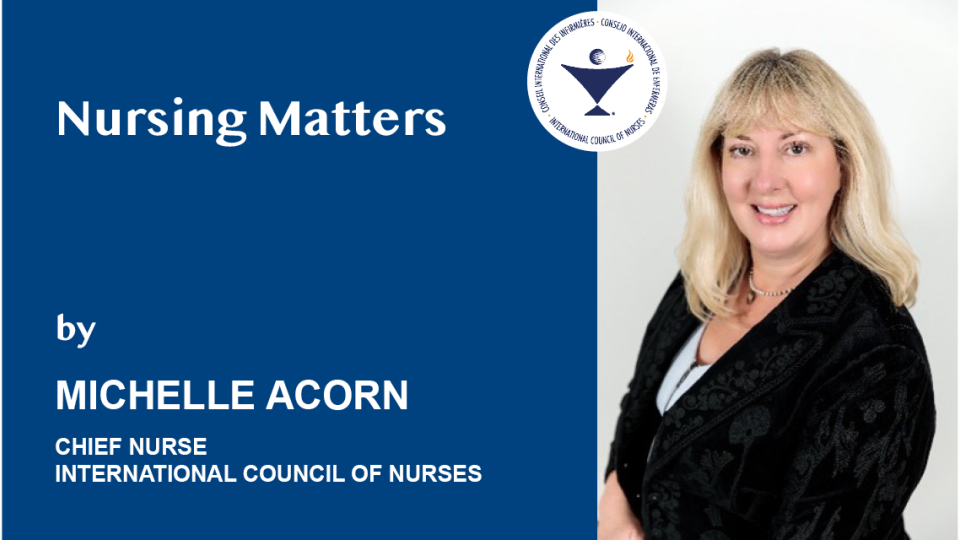ICN Chief Nurse Blog - August 2021

Advanced Practice Nursing – A Global Health System Solution
Professional transparency is paramount. I am an Advanced Practice Nurse (APN), dually registered as both a Primary Health Care and Adult Nurse Practitioner (NP) in Ontario, Canada. The NP role here, also known as Registered Nurse (RN) in the Extended Class, is title protected. After 12 years of RN experience, I became an NP and have been practicing for another 22 years. I am a past President of the Nurse Practitioner Association of Ontario, and former Chief Nurse for the province of Ontario.
Clinically, I began in the Emergency, then as Hospitalist, and next transitioned into geriatrics. I cherish my continued primary care practice in the community, supporting youth in the justice sector to keep current. My doctoral research demonstrated that in a nurse-led model of care NPs can function as most responsible providers, delivering hospital care from admission through discharge with high patient, family and staff satisfaction while providing evidence informed and quality care.
I strive to ensure that all the APN role dimensions add value in the domains of direct care clinical practice, leadership through executive practice as Chief Nurse and through building health system capacity, education through teaching future nurses, and through scholarship by disseminating or developing new knowledge.
ICN has two global APN publications to enhance clarity and support health services and outcomes, translated in English, French and Spanish.
1) Guidelines on Advanced Practice Nursing (April 2020)
2) Guidelines on Advanced Practice Nursing – Nurse Anesthetists (May 2021)
A third APN publication on nurse prescribing will be released in September. ICN established the ICN Nurse Practitioner/Advanced Practice Network (NP/APN Network) over 20 years ago. The network serves as an international resource and exchange forum with a diverse APN talent pool. Dr Daniela Lehwaldt is the current Network Chair. The active and engaged research, education, practice, health policy, communication and student subgroup activity are impressive and impactful. The network members represent over 103 countries.
A great exemplar of their reach and scale includes a competency mapping of 19 ICN member countries to bring clarity to the emerging roles.1
I hope to see you virtually at the 11th ICN NP/APN Network Conference. Envisioning advanced practice nursing beyond 2021: Wider reach, bigger impact runs from 29 August – 1 September. The conference is hosted by the Nurse Practitioner Association of Nova Scotia (NPANS) in collaboration with ICN and the Canadian Nurses Association (CNA).
Kudos to the EURO Region ICN Global Nurse Leadership Institute (GNLI) 2020 whose project focused on advanced practice roles for nursing and midwives, identifying progress on implementation in WHO Europe member countries and learning points which can be shared across the region. Their work is almost complete and includes eight case study countries. Professor John Unsworth, on behalf of the GNLI team, said ‘The findings show that even those countries who have successfully developed advanced practice roles start with a triad of interested practitioners, educators and leaders. From these small beginnings through to full policy implementation can take as long as 20-years but making a start is what is important’.
What they found in their qualitative study of how the role came about in various countries may surprise you and you can learn more at the ICN Congress in November.
Collaboratively yours in health,
Michelle
Dr. Michelle Acorn, ICN Chief Nurse, DNP, NP PHC/Adult, CGNC, FCAN
1 Sastre-Fullana, P., Gray, D. C., Cashin, A., Bryant-Lukosius, D., Schumann, L., Geese, F., Rae, B., Duff, E., & Bird, B. (2020). Visual analysis of global comparative mapping of the practice domains of the nurse practitioner/advanced practice nursing role in respondent countries. Journal of the American Association of Nurse Practitioners, 33(7), 496–505. https://doi.org/10.1097/JXX.0000000000000458